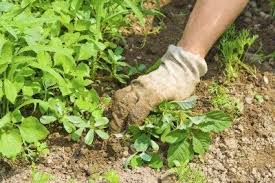Controlling Common Weeds

Having a beautiful lawn or productive veggie garden is not for the faint at heart. You’ve put plenty of time and effort into your landscaping, so when weeds start sprouting, some of them can take over quickly. They are, after all, wild plants that have adapted to their natural surroundings, and don’t need you to help them grow, so you’ll need to get a handle on them quickly! Let’s look at seven common weeds, and how you can keep them from sabotaging your hard work!
-
- Your garden will benefit from a Fall-planting of clover, as it provides nitrogen to the soil. but most homeowners don’t want it in their landscaped lawn. Mowing high over the plant will help it from reseeding but pulling them while they’re young is the best preventive.
-
- Crabgrass is a bane to many lawns, and it grows quickly once the rain hits the seeds. Pulling the roots is the easiest way to remove the plant, and even easier if the soil around it is damp.
-
- If you don’t care to add dandelions to your diet (yes, they are edible!), you’ll need to get them at the roots. Spray them with undiluted white vinegar until they’re thoroughly wet, and they will die within a few hours.
-
- Ground ivy, or creeping Charlie, is another weed that can be pulled effectively from wet soil. If you allow it to flower, make sure it doesn’t go to seed, or you’ll spend more time pulling new plants.
-
- Oxalis, or wood sorrel, has leaves that are almost clover-like, and purple or yellow blooms. Catch it early, and it can be pulled up by the roots, or use a soap-based herbicide to kill larger plants.
-
- A plant that has been cultivated in many hybrids, portulaca, can also be an aggressive weed. - Once you’ve dug them up, allow them to dry before you dispose them in a compost pile or other yard waste. They easily regenerate from any part of the plant.
-
- The thin, strong-scented single leaves that shoot up in our lawns are wild garlic. Mowing won’t stop them, as they’re sprouting from corms in the soil. Pull or dig them up, and make sure you have the whole corm to avoid new growth.
To avoid a lot of back-breaking weeding, mulch heavily in flower beds, and consider putting new plantings close together. Some weeds are so well-adapted that it doesn’t matter what you do. Garden.org has an extensive list of weeds with photos and ideas for controlling them without a lot of chemical intervention.
Courtesy of New Castle County DE Realtors Tucker Robbins and Carol Arnott Robbins.
Photo credit: gardeningknowhow.com





